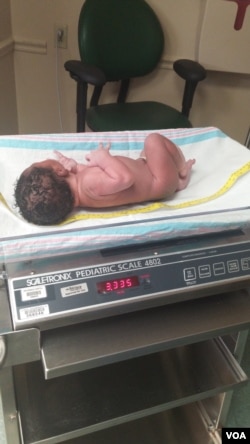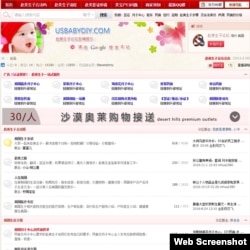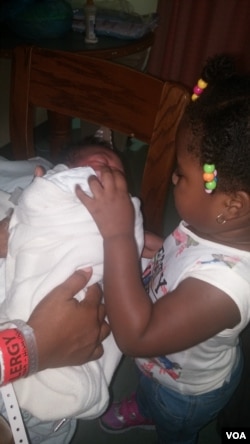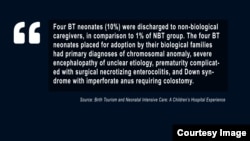Face covered in tears, Agnes endured each painful contraction in the basement where she had spent the past few months. Several hours later, she finally went to the emergency room of a Washington, D.C., hospital. Her husband, at home in Nigeria, cried when told by phone that she had delivered a healthy baby boy.
Their dream was finally reality: They had a son, one with a "guaranteed" future.
"I wanted to give my child an American passport," said Agnes, whose surname is being withheld to protect her child. "We believe when we come down there to have our babies, they are sure of a better future."
Much of the debate about immigration has been over whether to build a wall along the U.S.-Mexico border, whether to halt refugees from entering the U.S., and what to do about the families who have settled in the United States illegally.
On the campaign trail, President-elect Donald Trump dominated the airwaves, due in part to his calls for tighter immigration controls.
However, for thousands of foreigners who desire American residency, there is no need to go through lengthy immigration or asylum procedures. Instead, a "baby on the way" is all it takes to gain access to land.
There are no laws prohibiting foreigners from traveling to the United States to give birth; the children born here are automatically American citizens, according to the Constitution. However, in the attempt to gain citizenship for their children through birth, many commit immigration fraud, exploit the health care system and in some cases place the lives of the babies in jeopardy.
Illegal access
"There is nothing in the law that makes it illegal for pregnant women to enter the United States," said Virginia Kice, spokeswoman for U.S. Immigration and Customs Enforcement. She added, however, that the "vast majority" of women hoping for an American child misrepresent the purpose of their visit in order to gain tourist visas. That, Kice said, is criminal.
Even if they declare they are entering the U.S. to give birth, there is another barrier to overcome. The State Department notes visas are granted on an individual basis, but the family must provide proof of sufficient funds to cover any planned and unplanned medical costs.
Agnes, who improperly used a tourist visa, said many of her friends were denied visas for disclosing the truth of their pregnancies. "Some of them were turned back at the airport simply because they want to come and have the child," she said.
For those who make it through border controls without the right documentation, there is no threat of a penalty to the newborn. The child is still considered a beneficiary of the 14th Amendment, which grants citizenship to "all persons" born on U.S. soil, regardless of the laws broken to be born here.
The United States is in the minority of countries that still grant birthright citizenship.
And that has some Americans deeply upset.
"It's totally inappropriate to bestow U.S. citizenship on the child without requiring a minimum residency requirement," said Dan Stein, president of the Federation for American Immigration Reform (FAIR), a group opposed to birthright citizenship.
Stein argued that the 14th Amendment was never intended to undermine immigration controls by "allowing people to manipulate the system so that they could give birth to the people here, even though they really have no attachment to the community."
While there are no official numbers on "birth tourism," the Center for Immigration Studies estimates that about 36,000 women come to the United States every year to give birth so their children can automatically become American citizens. CIS, which favors lower levels of immigration, reports that "birth tourism" is largely practiced by Chinese, but families also come from Taiwan, South Korea, Nigeria, Turkey, Russia, Brazil and Mexico.
Many of these "birth tourists" hail from countries with economic or environmental instability; while some are motivated by the availability of better health care in the U.S., others hope the child may one day serve as the family ticket to the "American dream."
These children are able to return to the United States at any time to receive opportunities reserved for residents, including free public education during the primary and secondary years, government aid and scholarships. They are also eligible for certain jobs, including many government positions.
An added benefit is that a U.S. passport also allows visa-free or visa-on-arrival travel to most countries in the world — 174, according to Henley & Partners, a global ranking firm. Perhaps the most coveted privilege is that these children, when they turn 21, can sponsor a green card for their parents.
Very lucrative business
Several U.S. and international businesses have seen birth tourism as their passport to wealth. These outfits give promises of healthy babies, with "USA" stamped on their backsides, while charging fees up to $80,000.
Federal authorities raided several birthing houses last year in California, a hot spot for such businesses catering largely to Chinese women.
According to affidavits by federal investigators, the companies offered not just lodging, meals, drivers and translators, but also counseling on how to fraudulently secure visas, deceive U.S. immigration authorities and scam hospitals.
Undercover agents posing as clients were instructed by agencies to arrive two to three months before due dates, to wear loose clothing to hide protruding bellies and how to respond to customs officers in order to conceal the true intention of their visit.
In the investigation of Chao Chen and Dong Li, who ran one of the raided birthing operations (You Win USA), court documents state that while customers had the ability to pay $50,000 to the business owners, they failed to pay hospital bills that often exceeded $25,000 per birth. In most cases, customers paid about $4,000, an amount designed for indigent or low-income patients lacking insurance. In some cases, the families paid nothing at all.
According to ICE, the cases are all still pending, but depending on the nature of the activity and financial dealings of the business owners of such schemes, the birth house operators may also be charged with conspiracy and money laundering in addition to visa fraud.
Despite the federal crackdowns, businesses continue to market to a broad range of clients while representing American childbirth as an affordable option. Deluxe Childbirth Services targets African parents with ads promising an "error-free" birth in the U.S. for $6,000 or less. The business, based in California and Lagos, Nigeria, was co-founded in 2012 by a Nigerian woman who herself gave birth to three children in the United States.
In August, a private New Jersey hospital was exposed for advertising birthing services to families in Russia. "Childbirth in New York is the best investment in the future of your family!" read the Russian-language AmeriMama website, since taken down.
According to a report by NJ Spotlight, the "AmeriMama" program at Meadowlands Hospital Medical Center offered to arrange medical services and secure the baby's citizenship papers, passports and travel visas for fees ranging from $8,500 to $27,500. The hospital is now under new management; no charges were brought against the former managers.
Dangerous way to save
Back in her Lagos apartment, Agnes, the woman who spent part of her labor in a Washington basement, grappled with what she called the "Naija hustle": erratic electricity and surging prices for necessities like rice and cooking gas. Over the phone, the 33-year old mother of two complained about life in a country dealing with its worst economic downturn in more than a decade and plagued with a reputation of corruption across all levels of society.
That's why, she said, her family looked for ways to cut corners in her pursuit of U.S. citizenship for her younger child. Instead of an agency, Agnes opted to stay with a family recommended by her pastor. She also avoided regular checkups with an obstetrician, even after her pregnancy went several weeks past her estimated due date.
"I was scared I couldn't afford it," she said. "I was avoiding a lot of costs, like the antenatal [pre-birth] fee." Instead, she found a registered nurse who was willing, off the books, to stop by the house to administer a drug to induce labor. The medicine causes intense contractions and calls for close fetal monitoring, which was not done.
According to Olu Ibironke, a former midwife in Nigeria, foregoing proper medical oversight is a cost-cutting practice common among African birth tourists, with many choosing to not see a doctor until after their water breaks.
"It is cheaper but it is dangerous," said Ibironke.
Now serving as a registered nurse in a Maryland maternity ward, she told of a pregnant woman who arrived at the hospital for delivery and discovered her baby no longer had a heartbeat.
"A full-term baby! What do you say to that?" she added. "Sometimes it doesn't work out for them."
Researchers at Children's Hospital of Orange County, in southern California, documented more deaths and higher complications in the neonatal intensive care unit among babies born to the birth tourist families.
"They were more likely to need surgery" said Dr. Michel Mikhael, lead author of the study. "And just because they have more complex problems, they were more likely to stay in the hospital longer."
Longer hospital stays amount to even higher bills in a country where the costs for medical services are rising. For some families, the quest to save money becomes dangerous.
"That's the first thing they will ask — if he [the baby] is going to stay in [intensive care], how much am I going to come out with?" said Ibironke.
Mikhael added that many of the families in the study originated from the Middle East and China where, he said, treatment is sometimes based on cost rather than medical need.
"We come across a lot of times when a family says, 'OK, so how much will this antibiotic cost me? … Can I say, "Don't give my child antibiotics because I don't [want to] pay for it?" ' "
And in some cases of medical distress, the parents abandoned the children, leaving them to the adoption system. "They felt they are not going to be able to provide them with the same medical care back in their home country," Mikhael said.
Ethics and morals aside, this is a "crass manipulation of our generosity," said FAIR's Dan Stein, adding it's "an abuse of the system" to leave taxpayers with the cost of caring for these children.
Greater good
Some groups like FAIR are calling for an end to birthright citizenship, arguing for legislation that mandates newborns take their mother's citizenship until they have met a minimum residency requirement.
But UCLA law professor Hiroshi Motomura said it would be a "mistake" to try to change the law, considering the number of birth tourists.
"There are some times the rules benefit more than the group you intended it to, but the group you intended it to benefit is significant and larger, and so you stick with the rule," Motomura said, adding that it's a "classic 'tail wagging the dog' if you are letting a small number of people affect the citizenship of a much larger group."
Motomura said there are nearly 40 countries whose citizens do not need a visa to enter the United States and are able to have children in the country without committing visa fraud. Birth tourism, he said, should be looked at as a means to help these babies integrate into American society and the American workforce, adding that it's "an investment in getting really skilled immigrants 20 years down the road."
Esther Eghosa, who did not want her real name used, will join the workforce in a few months after her college graduation. Born in Boston, Massachusetts, her mother — then an airline stewardess — took her back to Nigeria when she was just a few weeks old. She returned at age 14 to complete high school and has gone on to earn an undergraduate degree in computer science; her college education, for the most part, has been paid for by federal and state grants.
Citing her experiences interning at a large government contracting firm, modeling on fashion runways and interviewing for a position with the CIA, Eghosa said she considered herself "blessed" to have been born in the U.S. American citizenship, she said, secured her a highly coveted, full-time job with security clearance. But, she conceded, it has not secured her allegiance.
"I classify myself more as Nigerian than American," she said. "I'm just using my citizenship for the opportunities."
While she loves living in the United States, she added that the last six years away from her family has been difficult; many nights she's cried, longing for a hug from her mother. A perfect world would be one where she could bring her loved ones to the United States, she said.
Her dream will become reality in a few months, when she begins the process of bringing her parents over to see the life she has created with the investment they made 20 years ago.




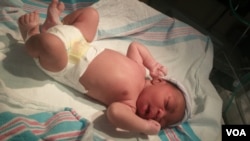
!["I wanted to give my child an American passport," said Agnes, whose surname is being withheld to protect her child. "We believe when we come [to the U.S.] to have our babies, they are sure of a better future." (J. Oni/VOA)](https://gdb.voanews.com/FFEE84F6-5CE5-465D-A515-B22CA94941F1_w250_r0_s.jpg)
